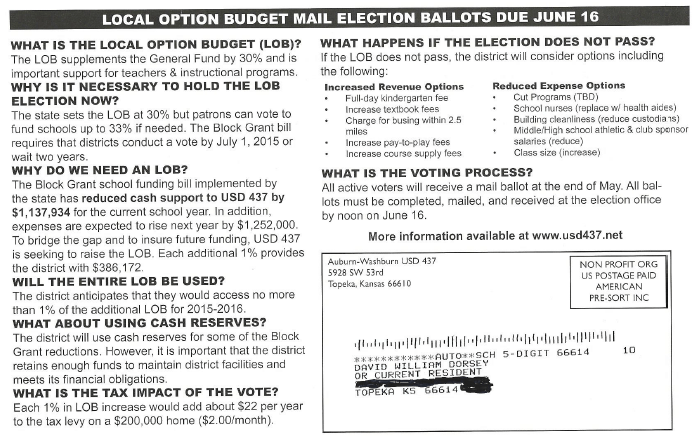Auburn-Washburn USD 437 is in the midst of a Local Option Budget (LOB) election, asking district voters to approve an up-to three mill increase in their taxing authority. As part of the effort to convince us to support their request, I received, along with every other USD 437 resident, a propaganda card via USPS last week. The card (of which I have provided both front and back) includes virtually every deceptive tactic used by school districts to cajole voters into supporting a tax increase, including the implication that without this extra money, the futures of little Evan and Clare are in doubt.
I must preface the following remarks by saying that I have largely supported the district’s expansion in the past, having enthusiastically voted in favor of building a new elementary school (Farley) several years ago. I also recognize that as school districts go, USD 437 is well run. Their administrative costs are below the state per-pupil average and are 17th lowest among the 25 largest districts statewide. And undoubtedly the relative quality of USD 437 plays a role in increasing property values in the district. Having said that, it doesn’t detract from the fact that this election is just plain unwarranted. Below is the flip side of the card followed by eight reasons why the election is truly needless.

 They already have the money. As the table shows, USD 437 has a consistent cash reserve balance of about $9 million each July 1. The card says they are going to use cash reserves to cover part of the “Block Grant reductions,” but the $386k in taxes they tell us they need represents less than five percent of the district’s cash reserves. If they pulled the $386k from those reserves (taxes they received in prior years but didn’t spend), they would still have several million more than in 2008 and prior years, and the district didn’t say they lacked sufficient reserves during those years.
They already have the money. As the table shows, USD 437 has a consistent cash reserve balance of about $9 million each July 1. The card says they are going to use cash reserves to cover part of the “Block Grant reductions,” but the $386k in taxes they tell us they need represents less than five percent of the district’s cash reserves. If they pulled the $386k from those reserves (taxes they received in prior years but didn’t spend), they would still have several million more than in 2008 and prior years, and the district didn’t say they lacked sufficient reserves during those years.
- They don’t spend the money they budget. In the 2013-14 school year, USD 437 spent nearly $2 million less than budgeted. Do they really expect the voters to believe they need another $386 thousand (out of a total budget of over $65 million – roughly six-tenths of a percent) to “maintain our excellent schools?”
- They use misleading tactics to imply they have, and will continue to suffer budget cuts under the block grant funding formula. They say (in bold, nonetheless) that the state reduced cash support by over $1.1 million for the current school year. Actually, the truth is under the three-year block grant funding law, USD 437 will get an increase in state aid of $1.4 million from $30.5 million to $31.9 million (4.3%).
- They act as if they have no authority over spending. According to the card “expenses are expected to rise next year by $1,252,000.” They speak of costs as if they are analogous to flood waters; that they are simply at their mercy and have no control over them. And this argument gets to the heart of the prevailing mentality that instead of trying to be more efficient with taxpayer money, school districts feel they are justly entitled to more taxpayer money.
- It’s simply a last-chance cash grab. Under block grant funding, districts must have LOB elections prior to July 1, 2015 or wait two years.
- It’s another false choice, right from the give-us-more-or-we’ll-have-to-cut playbook. The card itemizes six potential ways they “will consider” increasing fees/charges to students and five rather vague ways to reduce expenses. Do they really believe it will take a 1% increase in the LOB (again, that’s six-tenths of one percent of the total budget) to keep from increasing class sizes or from having to “Cut Programs (TBD)?”
- Kansas taxpayers are already overburdend and will experience yet another tax increase at the state level. School districts don’t operate in a vacuum. As USD 437 is asking their residents to pony up more money at a local level, the state legislature will be increasing taxes statewide by as much as $470 million. Those of us who will foot this bill can’t simply demand a pay raise to cover our increased food, insurance, transportation, or housing costs. So why should school districts be able to?
- It will not improve student outcomes. I saved the most important reason for last. Regardless of the dire implications, the result of this election will have exactly zero effect on the educational outcomes of little Evan and Clare when they enter kindergarten – three years from now!




